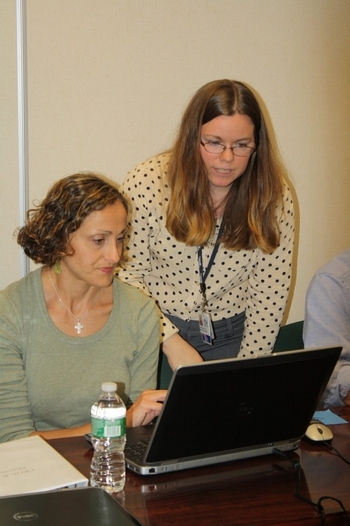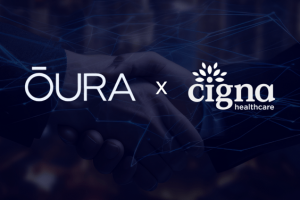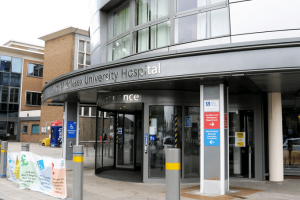WOODSVILLE — It may be small and it may be rural, but Cottage Hospital is continuing to show the way for other New Hampshire care providers, including most recently on Monday when it completed the requirements for yet another stage of a federal process for a electronic health record system.
A 25-bed critical-access hospital that serves communities in both the Granite State and Vermont, Cottage on Wednesday expected the Centers for Medicare & Medicaid Services (CMS) to accept its submission for Stage 2 Meaningful Use, according to Maryanne Aldrich, who is Cottage’s director of community relations and fund development.
The three-stage Meaningful Use program was created to provide incentives for hospitals to meet the financial burdens associated with technology costs. In Stage 1, participating hospitals have to prove their ability to capture and share data, while in Stage 2 they must demonstrate proficiency in tracking advanced clinical processes and in Stage 3 they must show improved outcomes.
In 2012, Cottage Hospital was the first critical-access hospital in New Hampshire to meet the Stage 1 goal and it may replicate that feat for Stage 2.
Aldrich said Cottage Hospital has always tried to be in the forefront of using electronic-health records, which the CMS said will help “improve quality, safety, efficiency, and reduce health disparities; engage patients and family; improve care coordination, and population and public health; maintain privacy and security of patient health information; and which will empower patients while hopefully — ultimately — leading to better clinical outcomes for them.
Cottage Hospital has recently undergone a multimillion dollar renovation and has received several honors, including being recognized last December by iVantage Health Analytics as a HealthStrong™ Award winner for Excellence in Efficiency. This January, Becker’s Hospital Review published its inaugural list of “50 Rural Hospital CEOs to Know,” and on the list is Maria Ryan, who has led Cottage Hospital since February 2010.
Greg Vasse, who is director of the Rural Quality Improvement Network with the NH Hospital Association’s Foundation for Healthy Communities, on Tuesday said Cottage Hospital’s attaining the MU2 level is a big feather in the hospital’s cap.
“This is a very good thing because, really, all hospitals, sooner or later have to achieve this, and the thing about MU2 is it begins to bring the patients into the picture, too, not just the reporting of data within the hospital. It’s beginning to demonstrate that your electronic-health record is able to communicate with your patient and able to communicate with another provider in the continuum of care.”
For example, said Vasse, if a patient is discharged from Cottage Hospital and referred to a skilled-care facility, the hospital, by having met the Meaningful Use standards, would be able to immediately transfer the patient’s records to the nursing home and to do so in a way that the latter could use it, even if the nursing home has an unrelated records system.
Having the medical record follow the patient prevents lapses in care or medication, said Vasse, who added that at the MU2 level, patients will be able to access a computer portal and view their own records within 36 hours of discharge.
Reaching the MU2 level will be just the latest accomplishment for Cottage Hospital which Vasse noted does “some astounding things for a hospital their size. They have enlightened leadership and dedicated staff; that’s the bottom line, and they’re very focused on patient care.”
“There’s lot of activities going on there,” Vasse said. “They are very proactive and do something called ’purposeful rounding’ meaning that patients can count on seeing a nurse every hour, and why that is important is if you’re a patient with limited mobility who needs to go to the bathroom and don’t know when the nurse is coming, you might be inclined to try to get up,” which, Vasse explained, could lead to a fall and further injury.
“Cottage has worked long and hard on ’purposeful rounds,’” said Vasse, and in the process has accumulated “one-of-a kind data in the state, and they show how they’ve been able to significantly reduce the number of times a patient uses the call bell.”
































